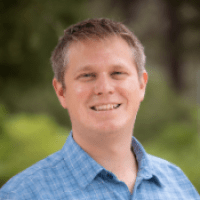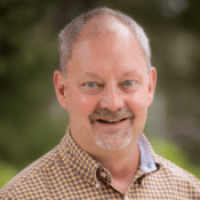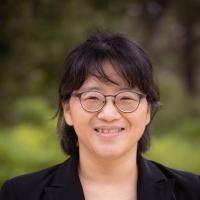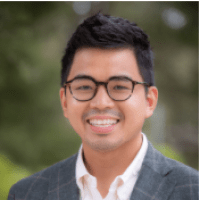Westmont Magazine Meet Our New Professors
Four new tenure-track professors joined Westmont’s faculty this fall: Ben Carlson (physics), Dan Jensen (engineering), Gewnhi “Gwen” Park (psychology) and Alastair Su (history). Johnny Jones serves as Westmont’s first artist/scholar-in-residence for diversity, equity, and inclusion.

Ben Carlson joins the Westmont physics department from the University of Pittsburgh, where he held a Samuel Langley postdoctoral fellowship. He works on the ATLAS Experiment at the Large Hadron Collider in Geneva, Switzerland, and has technical expertise on hadronic jet and missing transverse momentum triggers. He enjoys involving his students in his research, which focuses on dark matter and the Higgs boson, the subatomic particle that resulted in the 2013 Nobel prize. “About 3,000 people work on ATLAS, and I’ve directed the work of a number of successful undergraduate and graduate students,” he says. At Westmont, Ben continued to work on the ATLAS experiment with his students. “I also share short excerpts from books about science and faith,” he says. “Reading the work of people like physicist John Polkinghorne helps students build questions around what others have already been thinking about.” He earned a doctorate from Carnegie Mellon University in Pittsburgh.

Dan Jensen, director of engineering, seeks to prepare adaptive engineers committed to blending science, engineering and the arts. A senior fellow at the International Design Center at Singapore University of Technology and Design and MIT, he spent 21 years teaching engineering mechanics at the U.S. Air Force Academy. The new engineering program blends courses in engineering, physics, mathematics and chemistry to help students find innovative solutions to enduring problems through collaboration, problem-solving and moral discernment. Utilizing design by analogy, Jensen and his students work with global colleagues to find interesting principles in nature they can integrate into their designs to create products that improve people’s lives. “Jesus says love God — and people,” he says. “So how can engineers do that? We design things that we hope delight people and make their lives better.” He earned a doctorate in aerospace engineering from the University of Colorado at Boulder.

Gwen Park examines how the body and mind interact and influence different cognitive and emotional processes and social interaction. Her research examines the interaction between the brain and heart and how the cardiac vagal tone indicates how well the brain functions. She incorporates her findings into other self-regulatory systems, cognitive processing and emotional processing. She is also interested in cognitive models of psychopathology. Her research encompasses and bridges different topics from cognition (perception, attention, memory and decision-making), emotion and social cognition (moral judgement and cross-race effect). At Westmont, she seeks to integrate faith into her teaching and research. “I want my students to grow as Christian scholars and to understand the Christian perspective is consistent with, not antithetical to, scientific inquiry,” she says. Park earned a master’s degree and a doctorate in cognitive psychology from Ohio State University and most recently taught as an associate professor at Hope College in Michigan.

Alastair Su teaches U.S. history and is completing his first book about America and the opium trade in the 19th century. He says his overarching goal is supporting students as they navigate what it means to be both a Christian and a citizen of the United States. “I enjoy interacting with students and imparting a Christian worldview,” he says. “As an American historian, a fundamental part of my mission is teaching civics and helping students figure out what it means to be an American in this day and age.” He graduated Phi Beta Kappa from Harvard College and spent a year as a research associate at Harvard Business School before completing a doctorate in his- tory from Stanford University. He specializes in the historical evolution of the U.S. political economy with a focus on slavery and abolition, U.S. imperialism, drug addiction, Chinese migration and the Pacific world.
Other new instructors and lab coordinators include: Will Allison (physics/engineering), Evan Barnes (biology), Pauline Remy (serving a one-year position in Modern Languages; not pictured) and Terrance Yi (serving a one-year position in mathematics).
Johnny Jones, a writer and professor with more than a decade of experience teaching and working as a playwright and theater director, launched Westmont Festival Theatre’s first of three staged readings that explore diversity, equity and inclusion in Porter Theatre. The series of readings, named NEXUS: Readings from Black and Indigenous Playwrights, includes discussions after the readings.
Before coming to Westmont, Jones directed the African American Theater Program at the University of Louisville. He graduated from the University of Arkansas Pine Bluff and earned a Master of Arts from New York University and a Master of Fine Arts from California Institute of the Arts.
“My first goal and hope is to stage plays that engage the students and community with stories that feel new and that engage the very real issues of our times,” he says. “This is a privilege and a great responsibility. As we continue to live in this current moment of social change and a global pandemic, there is an effort to prioritize the achievements, needs and issues of Black, Indigenous and people of color communities.”
The first reading featured "Gloria," a dramatic comedy by Branden Jacobs-Jenkins, on Sept. 25.
“The staged reading went very well, was well attended, and featured a meaningful talkback afterwards,” Jones says.
The second installment featured “The Thanksgiving Play,” a satirical comedy written by Larissa FastHorse, a Native American playwright. The Nov. 6 reading also featured excerpts from Suzan Lori-Parks’ “365 Days/365 Plays.”
FastHorse’s satirical play tells the story of four white thespians tasked with devising an elementary school pageant about the first Thanksgiving while avoiding any culturally appropriative missteps. “I wanted to continue to read plays that focused on different dynamics of race, such as privilege and the problematic history of some of our holidays,” Jones says. “I enjoy Larissa FastHorse’s sense of humor and well-meaning in ‘The Thanksgiving Play.’ I also like the newness and her unique commentary on white privilege that isn’t too preachy.”
The performance featured Westmont students Faith German, Alaina Dean, Emiliana Brewer, Emily Derr, Claire Nemec, Ford Sachsenmaier, Joel Michelson and Simeon Michelson.
The series continued with a reading of “The White Card” by Claudia Rankine on Dec. 6.



